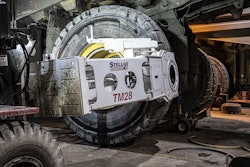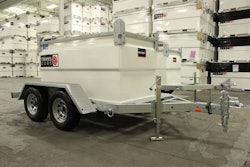
Winter can pose special challenges for machines with diesel exhaust fluid.
Follow this Winter Handling Checklist to properly store, handle, thaw and dispense DEF:
- Keep DEF tanks less than full to allow for freezing expansion
- Don’t add chemicals to melt frozen DEF
- Use only API-certified DEF products
- Rotate DEF stock, using older supplies first
- Store DEF between 12°F and 86°F
- Use closed, clean systems for dispensing
Why Diesel Exhaust Fluid Needs Special Winter Care
Made from a mixture of technically pure urea and purified water, DEF freezes at 11 degrees Fahrenheit and -11 degrees Celsius and needs to be properly maintained and dispensed to preserve its quality, says the American Petroleum Institute.
What Happens When DEF Freezes?
Like water, DEF expands up to 7% when frozen and can damage the storage tank if it is full or nearly full when it freezes. Therefore, it is a good idea to keep your DEF tank less than full in cold temperatures.
How to Safely Thaw Frozen DEF
If DEF freezes in the machine, do not put any additives in the tank to help it melt, API says. DEF needs to remain pure for it to work correctly. Instead, the heating element in the DEF tank will thaw it while the machine is running. On-spec DEF is specifically formulated to allow the fluid to thaw at the proper concentration to keep a machine operating smoothly.
Understanding DEF Shelf Life: How Long Does DEF Last?
API also cautions that the DEF has a limited life. If you’re operating in northern climates, this may mean you need to change it out before you put a machine back into service this spring.
The storage life of DEF is about 12 months in optimal conditions, so you need to know when it was put in the machine. If there’s a question, API recommends you drain it and replace it.
This is also true if the machine sat unused in the summer heat for a prolonged period or if the DEF was contaminated in any way.
Make sure you evaluate the DEF on shelves in your shop if it has been a while since the last delivery. You don’t want to replace the old DEF in your vehicle with an expired product. Although it’s not considered a hazardous material, make sure local regulations are followed while disposing of DEF.
In addition to cold, there are other things to consider when purchasing, storing and handling DEF. If you typically buy DEF in containers, always look at the expiration date on the bottle and be sure to use it before it expires.
Choosing High-Quality DEF
Check the label for recommended storage temperatures and be sure to look for the API certification mark on the bottle as well. Many diesel engine manufacturers recommend that operators use API-licensed DEF.
API says the biggest DEF misconception is the belief that if the urea concentration of their DEF is on spec, then the DEF meets the required quality. While it is true that the concentration is important, there are many other critical quality characteristics built into the ISO 22241 specification regarding DEF.
While buying DEF, make sure it meets the entire ISO quality standard. One way to do this is to ensure your supplier provides a Certificate of Analysis (or Quality) with every shipment. Also check to see if the DEF that you buy is licensed through API’s real-time directory of licensees on the API website.
DEF Handling Best Practices in Shops
Shops should ensure their DEF handling, storage and dispensing processes follow recommended procedures. Because DEF is temperature sensitive, make sure the DEF stock in containers is rotated to use the oldest product first.
Proper storage temperature is also vital. Storing in temperatures above 86 degrees Fahrenheit will limit the shelf life of the DEF over time.
Also, consider the following when storing and handling DEF:
- Bulk storage tanks should be dedicated for DEF. Don’t switch products in the bulk tank without thoroughly rinsing the tank with distilled or de-ionized water or on-spec DEF.
- A closed-loop system for transferring DEF from a drum or bulk tank is recommended to prevent contaminants from entering the DEF. This is particularly important in a shop or construction site with dust or dirt in the air.
- Use dedicated equipment for dispensing DEF. Don’t use funnels, pitchers, hoses, etc. that are used for other fluids when putting DEF in a tank.
- Anything used for dispensing DEF should be cleaned with distilled or de-ionized water and followed by a DEF rinse. Don’t use tap water for cleaning.
Keep Your DEF System Trouble-Free This Winter
It’s as important to know what you are putting into your DEF tank. DEF quality is as important as the quality of engine oils or fuel. Using API-licensed DEF will ensure that it meets the high standards required by engine and vehicle manufacturers.
Taken from information provided by Jeffrey Harmening, manager – DEF, Engine Oil Licensing Certification System (EOLCS) and the Motor Oil Matters (MOM) programs, American Petroleum Institute.














